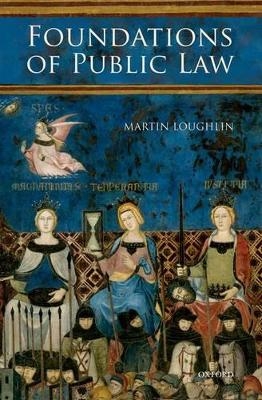
Foundations of Public Law
Oxford University Press (Verlag)
978-0-19-925685-3 (ISBN)
Foundations of Public Law offers an account of the formation of the discipline of public law with a view to identifying its essential character, explaining its particular modes of operation, and specifying its unique task. Building on the framework first outlined in The Idea of Public Law (OUP, 2003), the book conceives public law broadly as a type of law that comes into existence as a consequence of the secularization, rationalization and positivization of the medieval idea of fundamental law. Formed as a result of the changes that give birth to the modern state, public law establishes the authority and legitimacy of modern governmental ordering.
Public law today is a universal phenomenon, but its origins are European. Part I of the book examines the conditions of its formation, showing how much the concept borrowed from the refined debates of medieval jurists. Part II then examines the nature of public law. Drawing on a line of juristic inquiry that developed from the late sixteenth to the early nineteenth centuries-extending from Bodin, Althusius, Lipsius, Grotius, Hobbes, Spinoza, Locke and Pufendorf to the later works of Montesquieu, Rousseau, Kant, Fichte, Smith and Hegel-it presents an account of public law as a special type of political reason.
The remaining three Parts unpack the core elements of this concept: state, constitution, and government. By taking this broad approach to the subject, Professor Loughlin shows how, rather than being viewed as a limitation on power, law is better conceived as a means by which public power is generated. And by explaining the way that these core elements of state, constitution, and government were shaped respectively by the technological, bourgeois, and disciplinary revolutions of the sixteenth century through to the nineteenth century, he reveals a concept of public law of considerable ambiguity, complexity and resilience.
Martin Loughlin is Professor of Public Law at the London School of Economics & Political Science. His publications include Public Law and Political Theory (OUP, 1992), Legality and Locality: The Role of Law in Central-Local Government Relations (OUP, 1996), Sword and Scales: An Examination of the Relationship between Law & Politics (Hart Publishing, 2000), and The Idea of Public Law (OUP, 2003).
Introduction: Rediscovering Public Law ; PART I: ORIGINS ; 1. Medieval Origins ; 2. The Birth of Public Law ; PART II: FORMATION ; 3. The Architecture of Public Law ; 4. The Science of Political Right: I ; 5. The Science of Political Right: II ; 6. Political Jurisprudence ; PART III: STATE ; 7. The Concept of the State ; 8. The Constitution of the State ; 9. State Formation ; PART IV: CONSTITUTION ; 10. The Constitutional Contract ; 11. Rechtsstaat, Rule of Law, L'Etat de droit ; 12. Constitutional Rights ; PART V: GOVERNMENT ; 13. The Prerogatives of Government ; 14. Potentia ; 15. The New Architecture of Public Law
| Erscheint lt. Verlag | 10.6.2010 |
|---|---|
| Verlagsort | Oxford |
| Sprache | englisch |
| Maße | 163 x 237 mm |
| Gewicht | 922 g |
| Themenwelt | Recht / Steuern ► Allgemeines / Lexika |
| Recht / Steuern ► EU / Internationales Recht | |
| Recht / Steuern ► Öffentliches Recht | |
| Sozialwissenschaften ► Politik / Verwaltung ► Politische Theorie | |
| Sozialwissenschaften ► Politik / Verwaltung ► Staat / Verwaltung | |
| ISBN-10 | 0-19-925685-3 / 0199256853 |
| ISBN-13 | 978-0-19-925685-3 / 9780199256853 |
| Zustand | Neuware |
| Haben Sie eine Frage zum Produkt? |
aus dem Bereich


